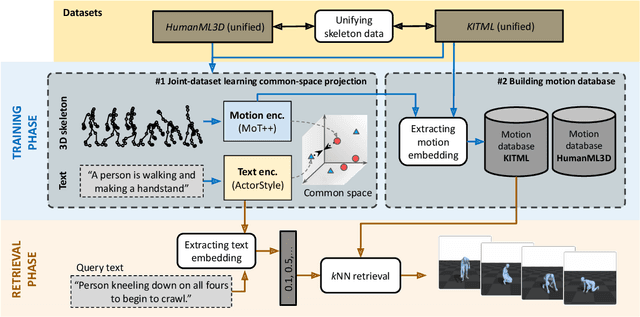Joint-Dataset Learning and Cross-Consistent Regularization for Text-to-Motion Retrieval
Paper and Code
Jul 02, 2024



Pose-estimation methods enable extracting human motion from common videos in the structured form of 3D skeleton sequences. Despite great application opportunities, effective content-based access to such spatio-temporal motion data is a challenging problem. In this paper, we focus on the recently introduced text-motion retrieval tasks, which aim to search for database motions that are the most relevant to a specified natural-language textual description (text-to-motion) and vice-versa (motion-to-text). Despite recent efforts to explore these promising avenues, a primary challenge remains the insufficient data available to train robust text-motion models effectively. To address this issue, we propose to investigate joint-dataset learning - where we train on multiple text-motion datasets simultaneously - together with the introduction of a Cross-Consistent Contrastive Loss function (CCCL), which regularizes the learned text-motion common space by imposing uni-modal constraints that augment the representation ability of the trained network. To learn a proper motion representation, we also introduce a transformer-based motion encoder, called MoT++, which employs spatio-temporal attention to process sequences of skeleton data. We demonstrate the benefits of the proposed approaches on the widely-used KIT Motion-Language and HumanML3D datasets. We perform detailed experimentation on joint-dataset learning and cross-dataset scenarios, showing the effectiveness of each introduced module in a carefully conducted ablation study and, in turn, pointing out the limitations of state-of-the-art methods.
 Add to Chrome
Add to Chrome Add to Firefox
Add to Firefox Add to Edge
Add to Edge